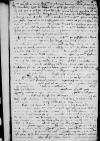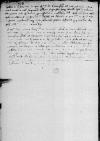Letter #1799
[Ioannes DANTISCUS] to [Tiedemann GIESE]Löbau (Lubawa), 1537-11-24
English register: Dantiscus is replying to Giese’s letter. He considers the words of gratitude it contained to be excessive, especially since he feels himself to be in Giese’s debt. He supposes the provision bullae will come from Rome no earlier than the spring. Dantiscus informs Giese about the preparations for his arrival in the Chełmno diocese. He is doing his best to make sure the new bishop finds everything in order. He declares that if it hadn’t been for the expenses related to last year’s stay at the Diet in Cracow, he would have left the whole of this year’s income at Giese’s disposal. In any case, he promises that Giese will find an abundance of everything needed for comfortable living. Dantiscus’ cousin (Szymon Hannow), who is managing the bishop’s estate in his name at present, will give Giese an inventory of all the movables. Dantiscus informs him that, giving in to the request of the Warmia Chapter, he will travel to Lidzbark via Olsztyn, and not Dobre Miasto as he had planned. He will notify Achatius (Trenck) of the route and time of the journey. With respect to Giese’s suggestions as to the possible ceremonies after Dantiscus’ arrival in the Warmia diocese, Dantiscus believes the official ingress can only take place once the papal provision arrives. Dantiscus agrees with Giese’s opinion as to the greed of bank agent Ioannes Brede. He promises to try to recover the money that Giese’s brother entrusted to Brede. In future, he advises Giese to post letters and documents via Cracow. Dantiscus tells Giese about the procedure for collecting excise duty: bishops’ estates and large and small towns don’t need written royal mandates; the mandates relating to the gentry have been delivered by royal chamberlain Wolski; the starostas will collect excise duty from the gentry; in bishops’ towns, just as in others, the millers have been obligated not to accept unmarked barley for milling – this rule is written in the Prussian Council’s letter to the king, a copy of which Dantiscus sent Giese; bishops are not exempted from excise duty. The issue of exempting Gdańsk residents from paying excise duty has yet to be resolved; Dantiscus is surprised that there were no protests concerning this during the assembly. Dantiscus doubts whether Maurycy Ferber could have assigned anyone (according to Giese’s letter, this was Ioannes Tymmermann) a pension without the Chapter’s knowledge and approval. He thanks Giese for the tidings – he is returning them together with the letter received from the Cracow bishop (Jan Chojeński). With reference to Chojeński’s letter, Dantiscus is pleased that the Wallachians have been defeated and hopes that the gentry come to their senses and take the opportunity to defeat them altogether.
Manuscript sources:
Prints:
| ||||||||||||||
Text & apparatus & commentary Plain text Text & commentary Text & apparatus Excerpts concerning Dantiscus' travels
Reverendissime Domine, frater et amice carissime ac plurimum honorande. Salutem fraternique amoris commendationem.
Cum tantum debeam Dominationi Vestrae Reverendissimae, quantum mihi ipsi, non est, cur tantopere mihi gratias agat.
Si quid feci,
cf. Sen. Con. 8.6 feci quod debui; Sen. Dial. 5.24.4 fecit quod debuit; Quint. Decl. 323.7 Ille quod debuit fecit; Vulg. Is 5.4 Quid est quod debui ultra facere vineae meae et non feci ei?; Vulg. Lc 17.10 quod debuimus facere fecimus ⌊id quod debui fecicf. Sen. Con. 8.6 feci quod debui; Sen. Dial. 5.24.4 fecit quod debuit; Quint. Decl. 323.7 Ille quod debuit fecit; Vulg. Is 5.4 Quid est quod debui ultra facere vineae meae et non feci ei?; Vulg. Lc 17.10 quod debuimus facere fecimus ⌋. Veniat haec nostra expeditio vel etiam cum ciconiis, expectandum beneque sperandum est. Interea hic dabitur diligens opera, ut omnia per me et officiales meos in commodum Dominationis Vestrae Reverendissimae, quantum amplius fieri possit, dirigantur. Si non fuisset profectio anni praeteriti ad
Ceterum, quod
De expilatione Gdanensium[2], quam inconsultis
cf.
[1 ] Letter from the Prussian Council to Sigismund I from the autumn assembly of 1537 in Grudziądz (print: Lengnich, doc. No. 83, p.212-214)
[2 ] cf.

